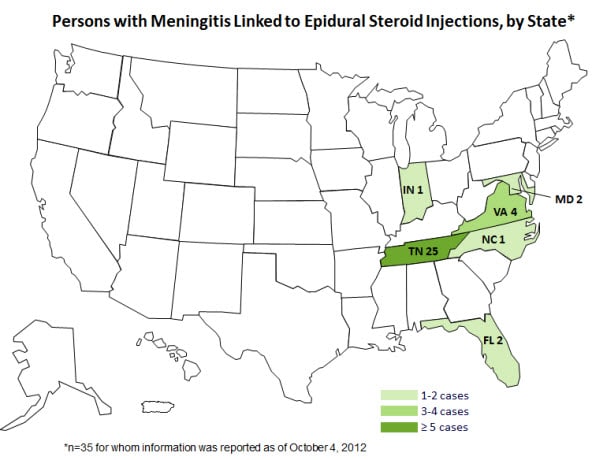Atlanta, GA–(ENEWSPF)–October 4, 2012 – Update 2pm EST
Summary:
The Center for Disease Control (CDC) is coordinating a multi-state investigation of meningitis among patients who received epidural steroid injections (medication injected into the spine). Several of these patients have had strokes related to the meningitis. In several patients, the meningitis was found to be caused by a fungus that is common in the environment but rarely causes meningitis. This form of meningitis is not contagious. The source of the fungus has not yet been identified, and the cause of infections in the other patients is still being assessed.
At-A-Glance
- Infection: Fungal Meningitis
- Facility Type: Outpatient Setting
- Case Count: 35
- States: 6
- Deaths: 5
Additional Federal Agencies Involved: FDA![]()
Patient Information:
Is the source of the outbreak known?
CDC is investigating medications and products that are associated with this outbreak of meningitis. At this point, there is not enough evidence to determine the original source of the outbreak, however there is a link to an injectable steroid medication. The lots of medication that were given to patients have been recalled by the manufacturer.
What are the states that received the implicated product?
California, Connecticut, Florida, Georgia, Idaho, Illinois, Indiana, Maryland, Michigan, Minnesota, North Carolina, New Hampshire, New Jersey, Nevada, New York, Ohio, Pennsylvania, Rhode Island, South Carolina, Tennessee, Virginia, Texas, and West Virginia
What is meningitis?
Meningitis refers to inflammation of the protective membranes covering the brain and spinal cord known as the meninges. The inflammation is usually caused by an infection frequently with a bacteria or virus, but meningitis can also be caused by less common pathogens such as fungi.
The severity of illness and the treatment for meningitis differ depending on the cause. Thus, it is important to know the specific cause of meningitis.
What is fungal meningitis?
Fungal meningitis occurs when the protective membranes that cover the brain and spinal cord are infected with a fungus. Fungal meningitis can develop after a fungus spreads through the bloodstream from somewhere else in the body, as a result of the fungus being introduced directly into the central nervous system, or by direct extension from an infected body site next to the central nervous system.
Is fungal meningitis common after epidural injections?
Epidural injections are generally very safe procedures, and complications are rare. Fungal meningitis is an extremely rare cause of meningitis overall, including after epidural injections. The type of epidural medication given to patients affected by this outbreak is not the same type of medication as that given to women during childbirth.
What are the symptoms of fungal meningitis?
Symptoms of fungal meningitis are similar to symptoms of other forms of meningitis, however they often appear more gradually and can be very mild at first. In addition to typical meningitis symptoms, like headache, fever, nausea, and stiffness of the neck, people with fungal meningitis may also experience confusion, dizziness, and discomfort from bright lights. Patients might just have one or two of these symptoms.
Meningitis Outbreak

Persons with meningitis linked to epidural steroid injections: Indiana (1), Maryland (2), Virginia (4), Tennessee (25), North Carolina (1), Florida (2).
Source: cdc.gov








